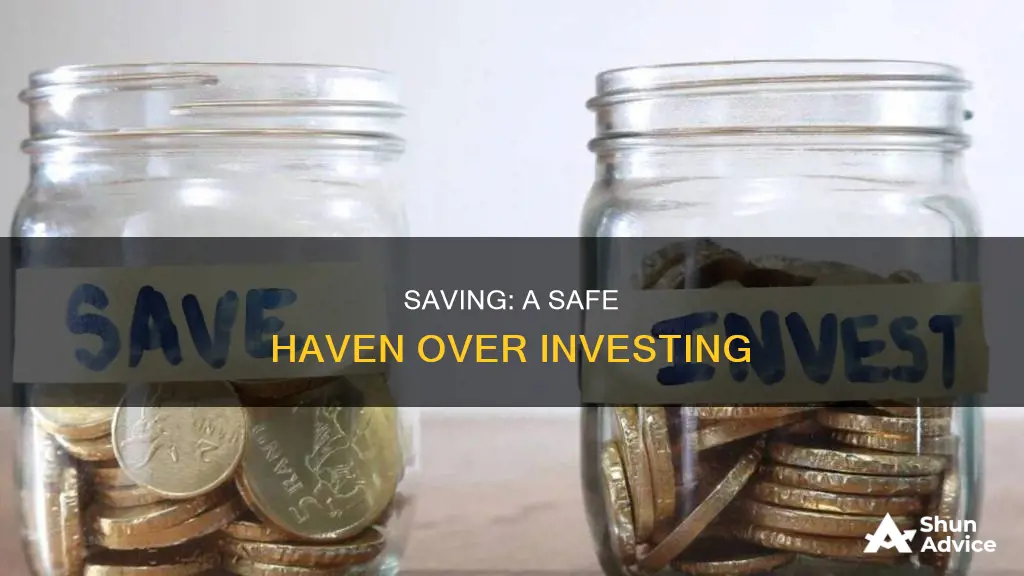
Saving and investing are both important concepts for building a sound financial foundation, but they are not the same thing. While both can help you achieve a more comfortable financial future, it is important to understand the differences and when it is best to save or invest. Saving is a way of storing your money until you need it, whereas investing is about putting your money to work for you, and this comes with more risk. The crucial difference between the two is the level of uncertainty about the money you'll get back. When saving, you'll always get back what you put in, but when investing, you'll see your money rise and fall over time and it's possible you may get back less.
| Characteristics | Values |
|---|---|
| Risk | Saving is safer than investing |
| Returns | Saving has lower returns than investing |
| Time | Saving is better for short-term goals, investing is better for long-term goals |
| Access | Savings are more accessible than investments |
| Inflation | Savings are more susceptible to inflation than investments |
What You'll Learn
- Saving is safer than investing, but may not result in the most wealth accumulated over time
- Savings accounts guarantee you will always get back what you put in
- Investing is about using your money with the aim of benefiting from the future potential of something you buy
- Savings accounts are usually for short-term goals, while investing is for longer-term goals
- Savings are a good option if you need the money within 5 years

Saving is safer than investing, but may not result in the most wealth accumulated over time
Saving is generally considered safer than investing, but it may not result in the most wealth accumulated over time.
Saving is a way of storing money until you need it, whereas investing is about putting your money to work for you, with the aim of benefiting from its future potential. Saving is typically done for the short term, while investing is for the longer term. When you save, you'll always get back what you put in, but when investing, you'll see your money rise and fall over time, and it's possible you may get back less.
The crucial difference between the two is the level of uncertainty about the money you'll get back. Saving is a safer option if you need to access your money quickly, as it is usually easily accessible. However, the money in savings accounts will not grow significantly and can be eroded by rising prices (inflation). This means that, over time, your savings may not have the same buying power when you come to spend it.
Investing, on the other hand, has the potential to grow more over the long term. Historically, in the UK, shares have done better than cash or even commercial property values. However, investing does come with more risk. There is no guarantee of making money, and you could get back less than you put in or even lose it all.
Therefore, saving is safer than investing, but it may not result in the most wealth accumulated over time due to the effects of inflation. It is important to consider your financial goals, risk tolerance, and time horizon when deciding whether to save or invest.
Retirement and Investment Expenses: Unraveling the Standard Deduction Mystery
You may want to see also

Savings accounts guarantee you will always get back what you put in
While the money you put into a savings account is always safe, the same cannot be said for its purchasing power. Due to inflation, the value of your savings will decrease over time. This means that while you will always get back what you put in, that money will be worth less than when you first deposited it.
To avoid losing purchasing power, you could consider investing. Unlike savings accounts, investments have the potential to grow your money over time. However, this comes with greater risk as there is no guarantee that you will get back what you put in. The value of your investments will rise and fall, and there is a chance you will get back less than you invested.
While savings accounts are a safer option, they typically offer lower returns than investments. This makes them ideal for short-term goals, such as saving for a holiday, wedding, or emergency fund. Investments, on the other hand, are better suited to long-term goals, such as retirement.
Whether you choose to save or invest depends on your financial goals, risk tolerance, and time horizon. If you need access to your money in the short term and want to guarantee that you will get back what you put in, then a savings account is the best option. However, if you are willing to take on more risk and can leave your money invested for several years, then investing may be a better choice.
The Danoff Investment Doctrine: A Study in Contrarian Philosophy
You may want to see also

Investing is about using your money with the aim of benefiting from the future potential of something you buy
There are different ways to invest, each carrying its own level of risk and potential return. Shares, for example, are when you buy a tiny slice of an individual company. The value of shares can fluctuate in response to general economic and market conditions, the prospects of individual companies, and industry sectors. Stocks are considered riskier than investing in a money market or savings account but have the potential to provide higher returns. Bonds are issued by companies or governments to help finance their processes. Property, or real estate, often refers to commercial investments rather than residential property. Funds are managed by an expert, who chooses investments on your behalf based on the fund's objectives.
The power of compounding is an important concept in investing. This is when an investment generates earnings or dividends, which are then reinvested and generate their own earnings. This can lead to significant growth in the value of your investment over time.
Another important aspect of investing is diversification. By choosing different investments and types of investments, you can reduce the overall risk of your portfolio while still aiming for strong returns.
Investing is generally recommended for long-term goals, such as retirement planning, saving for a child's education, or buying a home. It is important to have a sufficient emergency fund in place and to be in a stable financial position before investing.
The Resident's Dilemma: Pay Off Loans or Invest?
You may want to see also

Savings accounts are usually for short-term goals, while investing is for longer-term goals
Savings accounts are typically used for short-term goals, while investing is for longer-term goals. This is because savings accounts are a way of storing your money until you need it, whereas investing is about putting your money to work for you over time.
If you're saving for something specific, such as a holiday, a wedding, or a house deposit, a savings account is a good option. You can add to your savings in one-off or regular payments, and if you use an easy-access savings account, you can get back what you put in, plus any interest you've earned, whenever you want. Savings accounts are also a good way to build up an emergency fund of three to six months' worth of living expenses. This can help you cover unexpected costs, such as a medical emergency or car repair.
However, it's important to remember that savings accounts typically have lower returns than investments. While your money in a savings account won't lose value, it may not keep up with rising prices or inflation, so you could lose money in real terms. Additionally, interest rates on savings accounts can be low, and if they don't beat inflation, your purchasing power will drop over time.
On the other hand, investing is a way to make your money work for you and is typically done over a longer period. Investing involves putting your money into something with the aim of making a profit in the long run. There are different ways to invest, such as buying shares in a company or investing in funds managed by experts. Investing comes with more risk than saving as the value of your investments can go up and down, and you may get back less than you put in. However, the benefit of taking this calculated risk is the potential to make more money than you would from a savings account.
When deciding whether to save or invest, it's important to consider your goals and time horizon. If you need money in the short term, saving is usually the better option. However, if you're saving for retirement or another long-term goal, investing may be a better choice as it can help your money grow more over time.
Chinese Investors: Where They Put Their Money
You may want to see also

Savings are a good option if you need the money within 5 years
Savings are generally considered a good option if you need the money within five years. This is because savings are typically low-risk and allow you to easily access your funds.
Saving is a way of storing your money until you need it. It is setting aside some of your money for future use rather than spending it. You can add to your savings through one-off or regular payments. If you use an easy-access savings account, you can withdraw your money whenever you want, along with the interest you've earned.
There are several benefits to saving. Firstly, it provides a financial safety net for unexpected events and short-term goals. Secondly, it is a safe option as it has a low risk of losing value. Under the Financial Services Compensation Scheme (FSCS), if a UK bank or building society you save with goes bust, you can get back up to £85,000 of your savings. Thirdly, it is straightforward and easy to do.
However, there are also some drawbacks to saving. Interest rates can go up and down, and if they are low, the return on your money will be modest. There is a risk that it won't beat inflation, which is the rate at which the prices of goods and services increase. Therefore, while the money in your savings account is not going anywhere, its purchasing power drops over time, meaning it will buy you less.
If you need money in the short term, such as for a home deposit, saving is a sensible option. It is also a good idea to build up an emergency fund of at least three months' worth of living expenses that you can easily access.
Overall, savings are a good option if you need the money within five years as they provide a safe and accessible way to store your money. However, it is important to consider the potential drawbacks, such as low interest rates and the risk of not keeping up with inflation.
Wyndham's Annual Investor Count
You may want to see also
Frequently asked questions
Saving is generally safer than investing because the amount of money in your savings account will not decrease over time unless you withdraw the funds. On the other hand, investing is riskier because there is always the possibility of losing some or all of your investment.
Savings accounts offer more flexibility in terms of withdrawing money. With an easy-access savings account, you can withdraw your money whenever you want, whereas investing typically involves a longer wait time to access funds.
Saving is generally better for short-term financial goals, such as saving for a large purchase or an emergency fund. Investing, on the other hand, is typically used for longer-term goals, such as retirement or a child's education.







